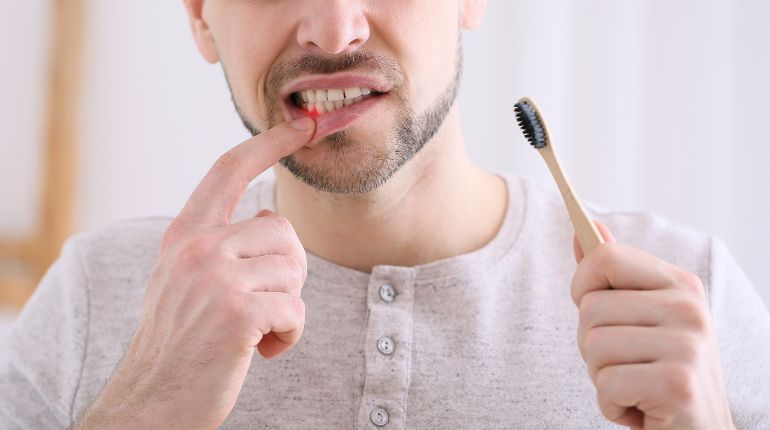


What to Do If Tooth Bleeding While Brushing

Noticing blood on your toothbrush or in the sink after brushing can be alarming. It is not the tooth but the gums that are bleeding. Gum bleeding while brushing is a sign that something might be wrong with your oral health, and it’s essential to address it promptly to prevent further complications. Whether it’s a minor issue or something more serious, understanding the possible causes and knowing what steps to take can help protect your smile.
In this blog, we will explore why your gums might bleed during brushing and what you should do next. To ensure your oral health is on the right track, visiting a dental clinic in Bistupur is highly recommended for a thorough examination and personalized care.
Common Causes of Bleeding
Gum Disease: One of the most common reasons for bleeding gums is gum disease, ranging from mild gingivitis to more severe periodontitis. Gingivitis is the early stage of gum disease and is often caused by plaque buildup along the gumline. If left untreated, it can progress to periodontitis, where the gums pull away from the teeth, leading to more severe bleeding and even tooth loss.
Brushing Too Hard: While it’s important to brush your teeth thoroughly, brushing too hard can irritate your gums and cause them to bleed. Using a toothbrush with hard bristles can also contribute to this issue. Remember, a gentle touch and a soft-bristled toothbrush are all you need to clean your teeth effectively.
Poor Oral Hygiene: Inadequate brushing and flossing can lead to the accumulation of plaque, a sticky film of bacteria on your teeth. Over time, plaque hardens into tartar, which irritates the gums and causes them to bleed. Maintaining good oral hygiene is crucial to prevent these issues.
Vitamin Deficiencies: Lack of certain vitamins, particularly vitamin C and vitamin K, can lead to bleeding gums. Vitamin C is essential for gum health, while vitamin K helps with blood clotting. Ensuring you have a balanced diet rich in these vitamins can help prevent gum bleeding.
Medication: Some medications, such as blood thinners, can increase the likelihood of bleeding gums. If you’re on such medication, it’s important to inform your dentist so they can provide the best care for your specific needs.
Steps to Take After Gum Bleeding
Assess the Situation: The first step is to identify the possible cause of the bleeding. Consider whether you’ve been brushing too hard, using a hard-bristled toothbrush, or missing a few days of proper oral hygiene. Understanding the cause can help you make the necessary adjustments.
Improve Your Oral Hygiene: If your bleeding is due to poor oral hygiene, it’s time to step up your routine. Brush twice daily with a soft-bristled toothbrush and use gentle, circular motions. Floss daily to remove plaque from areas your toothbrush can’t reach. Consider using an antiseptic mouthwash to reduce bacteria in your mouth.
Be Gentle: If you suspect brushing too hard is the cause, switch to a softer toothbrush and use less pressure. Brushing your teeth should not cause pain or discomfort. Gentle brushing is just as effective in removing plaque and protecting your gums.
Rinse with Salt Water: A simple saltwater rinse can help soothe irritated gums and reduce inflammation. Mix half a teaspoon of salt in a glass of warm water and rinse your mouth for about 30 seconds. This can help promote healing and reduce gum bleeding.
Visit a Dental Clinic: If the bleeding persists despite your efforts, it’s crucial to visit a dental clinic in Bistupur. A dentist can thoroughly examine the underlying cause of the bleeding and provide appropriate treatment. Whether it’s a professional cleaning to remove tartar buildup or treatment for gum disease, timely intervention can prevent further complications.
Preventing Future Bleeding
- Maintain a Consistent Oral Hygiene Routine: Brush and floss regularly to keep plaque and tartar at bay.
- Use the Right Tools: Opt for a soft-bristled toothbrush and fluoride toothpaste to protect your gums.
- Eat a Balanced Diet: Include foods rich in vitamins C and K to support gum health.
- Stay Hydrated: Drinking plenty of water helps wash away food particles and bacteria that can irritate your gums.
- Regular Dental Check-Ups: Regular visits to your healthcare provider ensure that any potential issues are caught early and treated before they become serious.
Conclusion
In summary, bleeding while brushing is not something to ignore. It’s a sign that your gums need attention and care. By improving your oral hygiene routine, brushing gently, and seeking professional advice when necessary, you can prevent further complications and maintain a healthy, confident smile.
If you’re concerned about persistent gum bleeding or any other dental issues, don’t hesitate to schedule a visit to a dental clinic in Bistupur. The experienced dental professionals there can provide a thorough examination, offer personalized advice, and help you take the right steps to protect your oral health.